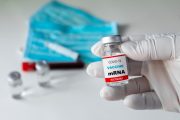
After podcaster Joe Rogan claimed he’d beaten back COVID-19 with a cocktail of drugs including ivermectin, the enforcers of approved opinion went into overdrive, saying Rogan had ingested “horse dewormer” and emergency rooms were being flooded with people who had overdosed on the same drug.
The story, however, is only half true at best.
On Wednesday, Rogan said he’d begun feeling ill the previous weekend, and after he tested positive for COVID-19, he “threw the kitchen sink at it,” taking a variety of medications including ivermectin, an anti-parasitic drug. Rogan credited this course of treatment with his rapid recovery, saying he “really only had one bad day.”
Such dissident commentary — suggesting that something other than vaccines could stop COVID-19 — could not be allowed to stand, especially coming from a man who had already questioned whether young people should be vaccinated and vocally opposed vaccine passports.
Rolling Stone took it upon itself to rectify the matter by publishing not one but two articles on Rogan and ivermectin.
The first, published Wednesday, was titled “‘Crazy Times’: Joe Rogan Got Covid and Ate a Cocktail of Meds Including a Horse Dewormer.” The piece claimed that “ivermectin … has gained traction as a ‘cure’ for Covid-19 especially in far-right circles, despite their [sic] being zero evidence that it is safe or effective to treat the coronavirus.”
The notion that Rogan — and perhaps countless other Americans — had taken “horse dewormer” to treat COVID-19 became an instant punchline. As of this writing, a Google search for “joe rogan horse dewormer” returns about 517,000 hits.
Reality, of course, is a bit more complex. Ivermectin has been used to treat both animals and humans for four decades. Columnist Michelle Malkin recently observed:
Billions of humans around the world have taken ivermectin (approved by the FDA and considered an “essential medicine” by the World Health Organization) under mass distribution programs to eradicate onchocerciasis (river blindness) and other tropical diseases. Ivermectin has also been shown to inhibit a broad range of viruses in laboratory studies, including HIV, influenza, West Nile virus and other RNA viruses.
Moreover, contra Rolling Stone, there are quite a few studies showing ivermectin may be helpful in treating COVID-19.
It’s true that ivermectin is also sold as a horse dewormer and can be bought at farm-supply stores in that form without a prescription. The dosage, obviously, is considerably larger for a horse than for a human. However, as Slate pointed out in 2011, “in some instances, if you get the dose [of a veterinary medicine] right you’ll be fine, since a good many animal pills contain exactly the same ingredients as their human analogues (just in different proportions).”
Rolling Stone, though, would prefer people to think that Americans are too stupid to realize that and should stick to the advice of their betters in the public-health bureaucracy. On Friday, the magazine published a second article claiming that emergency rooms are being overwhelmed by people who have overdosed on “horse dewormer.”
That article was essentially a rehash of a story originally published by Oklahoma City’s KFOR-TV. The source for that story was a single Oklahoma doctor, Jason McElyea, who claimed that “patients are packing his eastern and southeastern Oklahoma hospitals after taking ivermectin doses meant for a full-sized horse, because they believed false claims the horse de-wormer could fight COVID-19.”
“The ERs are so backed up that gunshot victims were having hard times getting to facilities where they can get definitive care and be treated,” he said.
McElyea’s assertions apparently attracted so much attention that a hospital with which he is affiliated felt the need to post a statement on its website’s home page distancing itself from both McElyea and his remarks. Northeastern Health System – Sequoyah states that McElyea “is affiliated with a medical staffing group that provides coverage for our emergency room” but “has not worked at our Sallisaw location in over 2 months.” Furthermore, “NHS Sequoyah has not treated any patients due to complications related to taking ivermectin,” and “our hospital has not had to turn away any patients seeking emergency care.”
In fact, in the entire state of Oklahoma, with a population of almost four million, only 11 people have been reported to the state’s poison-control office for ivermectin exposure in the last four months, the office’s managing director told the New York Daily News.
And what of McElyea’s claim that “gunshot victims” were being denied treatment because of all the ivermectin-overdose cases? ZeroHedge did a little investigation and found that McElyea also works as a general practitioner at a hospital in Grove, Oklahoma, a city of 7,129 people that endured “just 14 aggravated assaults in all of 2019.”
“We somehow doubt that ‘gunshot victims were lining up outside the ER,’ while just 11 ivermectin related hospital cases have been reported in the entire state since the beginning of May,” added ZeroHedge.
In other words, other than the fact that Rogan took ivermectin, everything else Rolling Stone had to say about the matter was bunk.




